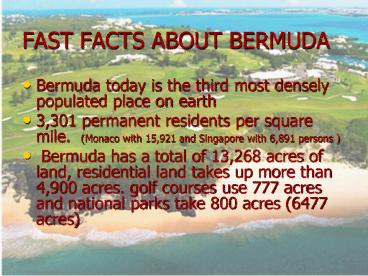FAST FACTS ABOUT BERMUDA - PowerPoint PPT Presentation
1 / 73
Title:
FAST FACTS ABOUT BERMUDA
Description:
INTENSIVE MULITI-FARMING On ... Because Aquaponics use natural animal waste, the finished product can be certified as being Organic ... three dairy ... – PowerPoint PPT presentation
Number of Views:178
Avg rating:3.0/5.0
Title: FAST FACTS ABOUT BERMUDA
1
FAST FACTS ABOUT BERMUDA
- Bermuda today is the third most densely populated
place on earth - 3,301 permanent residents per square mile.
(Monaco with 15,921 and Singapore with 6,891
persons ) - Bermuda has a total of 13,268 acres of land,
residential land takes up more than 4,900 acres.
golf courses use 777 acres and national parks
take 800 acres (6477 acres)
2
FAST FACTS ABOUT BERMUDA
- During the "Golden Age of Agriculture", 1800s,
agriculture had an estimated 3000 farm workers
cultivating 3000 acres of land - Today there is only 735 acres of arable land
available for agricultural use, only 360 acres
are being actively farmed. (roughly ½ in use) - Today there are only seven full-time vegetable
farmers, three dairy operations, two poultry
farms and 33 part-time farmers in the industry. - Source greenrock.org Royal Gazette
3
WHAT DOES THIS MEAN?
- It means Bermuda has 194 residents per 1 acre of
agriculture production - World average is 2 acres to feed 1 person for 1
year. (Climate dependent) - Bermuda's ability to produce enough food locally
to feed itself has been lost. - Two and a half to three million dollars leaves
Bermuda each week to pay for the food thats
coming in, (source Royal Gazette)
4
WHAT DOES THIS MEAN?
- It means that because Bermuda is dependent on
on-time deliveries from other countries of even
basic food stuffsany disruption of deliveries
for even 1 week would create a serious food
shortage. - It also means there could be great opportunities
for local fish and vegetable farmers using
modern high density growing methods to make a
good living filling this demand.
5
INTENSIVE MULITI-FARMING
6
On ½ Acre Today
- 200,000 pounds of fish
- 90,000 pounds of vegetables
- For example
- 400,000 heads of lettuce
- OR
7
ON ½ ACRE TODAY
- 25,000 pounds of fish
- 150,000 pounds of vegetables
- Example 700,000 heads of lettuce
- The same amount of produce one would get with 1
acre in traditional farming plus the fish.
8
AQUACULTUREThe farming of the water
- FIN FISH
- SHRIMP
- SHELLFISH
- WATER PLANTS
9
AQUAPONICSTURNING WASTE INTO PROFITS
- .
10
OFFSHORE MARICULTURE
11
ON SHORERECIRCULATING SYSTEMS
12
ROUND TANK SYSTEMS
13
RETANGULAR TANK SYSTEMS(RACEWAYS)
14
.
- .
15
ASSEMBLED SYSTEM
- .
16
RETANGULAR TANK SYSTEMS(RACEWAYS)
17
SOLIDS FILTERS
18
SOLIDS FILTERS
19
DRUM FILTERS
20
BIO FILTERS
21
(No Transcript)
22
23
(No Transcript)
24
FISH IN AQUACULTURE
25
(No Transcript)
26
COMMERCIAL FISH FEED
27
FISH FEED
- Commercial feeds verses growing your own
28
POPULAR NATURAL FISH FEED
29
WATER HYACINTHS
30
(No Transcript)
31
FISH WEIGHT TO LENGTH
32
SYSTEM COSTS
33
(No Transcript)
34
(No Transcript)
35
(No Transcript)
36
(No Transcript)
37
(No Transcript)
38
(No Transcript)
39
(No Transcript)
40
(No Transcript)
41
(No Transcript)
42
(No Transcript)
43
(No Transcript)
44
(No Transcript)
45
(No Transcript)
46
(No Transcript)
47
(No Transcript)
48
AQUAPONICS
- Aquaponics is the practice of taking the waste
from a fish tank system and turning it into
fertilizer to grow vegetables. - Not to be confused with Hydroponics which used
Chemical fertilizer. - Because Aquaponics use natural animal waste,
the finished product can be certified as being
Organic
49
As with the high density growing of fish, today
we can a small amount of space and grow the
amount of product as would normally take several
acres.
50
The variety of crops is unlimited
- L
51
A Complete market basket
- From
Chili Peppers to -
Lettuce and Herbs
52
High quality, packaged for freshnessbring
premium prices
53
Small scale aquaponics concept
- In some small scale operations where the culture
of the fish is the secondary concern, the
aquaponics is the fish system filter.
54
In a high volume fish systems the aquaponics are
separated from the fish system
55
(No Transcript)
56
(No Transcript)
57
(No Transcript)
58
(No Transcript)
59
(No Transcript)
60
(No Transcript)
61
(No Transcript)
62
(No Transcript)
63
(No Transcript)
64
(No Transcript)
65
(No Transcript)
66
LETTUCE
67
STRAWBERRIES
68
HERBSBASIL
69
PEPPERS
70
TOMATOES
71
(No Transcript)
72
(No Transcript)
73
(No Transcript)

